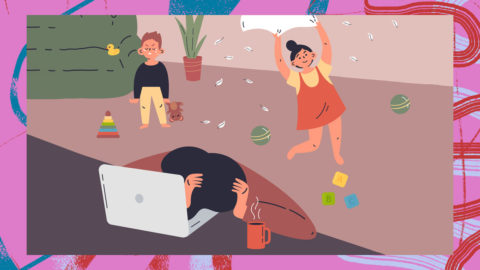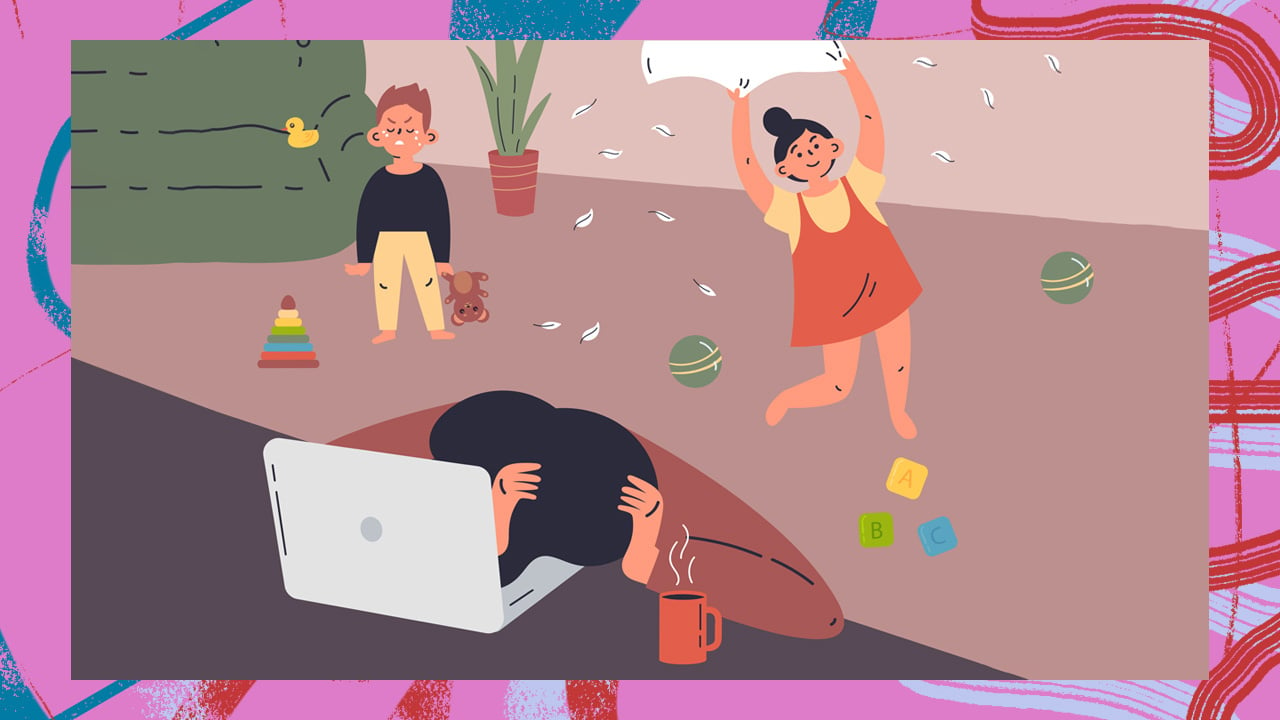Is Equitable Parenting Even Possible?
With stats showing that women still account for the majority of child care responsibilities in heterosexual couples, it seems like we have a long way to go towards 50/50 parenting

Born in the early 1980s, I—one of the oldest of the avocado toast-purveyors known as millennials—have a deep, dark secret: I’m afraid to have children; but it’s not for the reasons you might think.
While I am afraid, to some extent, of pregnancy and the risk to my health and life that it entails (FYI, Black women in the United States have a maternal mortality rate that is approximately three times higher than their white counterparts and five times higher for those in the UK. There are currently no stats for Canada, due to a dearth of race-based data within public institutions), there’s something else about pregnancy that scares me even more. It’s what comes after my child comes into this world.
The truth is: I’m afraid of ending up bearing the brunt of child care responsibilities. Because after a few relationships of my own, and seeing some of my smart, amazing, feminist friends in heterosexual relationships that are less than egalitarian, I have to wonder: Is equitable parenting truly possible?
My past relationships convinced me I’d be carrying the brunt of parenting
In both of my prior serious relationships, I am certain that I would have ended up with more of the burden, whether it was because of what my partner explicitly said or my lack of faith in their ability to handle the tasks of modern-day parenting—either way, it would have made me resentful if we had become parents.
My current partner of a year is very different; children wouldn’t even be on the table if he wasn’t. He has already suggested that we both take a full year of parental leave at the same time, which we are lucky and privileged enough to be able to afford to do. This could go a long way towards our efforts to avoid falling into a gendered pattern in our relationship if we were to have a child—according to Darcy Lockman, a clinical psychologist and author of All the Rage: Mothers, Fathers, And The Myth of Equal Partnership, significant paternity leave has good payoffs for the division of labour, and especially if the father is able to take some leave alone with the baby. But a year of leave is the rare exception, and not the rule.
And the stats kind of confirm it
And though I am now with this unicorn of a human male, I’m still a little afraid. Because the stats aren’t that reassuring. A 2018 survey by Statistics Canada found that women still account for the majority of household and childcare work done by parents. Another recent study found that women in heterosexual couples do more household chores than their male partners, regardless of their respective careers or incomes. And the parents that I see on social media working from home during the pandemic corroborate these stats. In my circle, it’s mostly mothers that I see posting children’s schedules, routines and activities, and taking on simultaneous roles of scheduler, teacher, caregiver and worker. Even when everyone is home, mothers are still the taskmasters. One of the mom subreddits that I follow is rife with complaints of fathers spending their time playing video games, watching their kids out of the corner of their eye or ignoring them all together, but I see no reports of mothers shooing away their kids to make a Sims 4 family for eight hours in r/daddit.
And this inequity is even happening in what society would deem “progressive couples,” according to Lockman. A 2015 study from Ohio State University showed that even though dual-career couples often share household chores equally pre-baby (with 95% of the studies participants agreeing before baby that both parents would equally share responsibilities), a baby dramatically changes the division of labour. Though both parents continued to work the same amount of hours they did before baby, women did more childcare. “It takes many women—who thought their partners had made a prenatal commitment to equal parenting—by surprise,” Lockman says of these findings.
It’s important to note that the dynamics in LGBTQ couples can be very different. While same-sex partners still face gendered expectations of fatherhood and motherhood at work—something in which breadwinning status can play a role—research shows that more often household tasks are balanced or split based on quality of task, temperament and ability, which is a much saner and fairer way to do things.
As disconcerting as these stats for heterosexual couples may be, it’s not *that* surprising that these gender divisions remain; because we’re encouraged into traditional roles by structural forces, policies and norms that are hard to shake. “The division of labour situation is an outgrowth of growing up in a patriarchy [and a] society that privileges the needs, ambitions and comforts of men over women,” Lockman says.
And as much as we may want to upend these norms, it’s super easy to fall into gendered patterns pressures, even if you are egalitarian. “You have your own beliefs about gender roles but it doesn’t take us out of a society that still, in a lot of ways, reinforces [them],” says Dr. Sarah Schoppe-Sullivan, a professor at the Ohio State University and expert in the study of co-parenting. “And where that is the backdrop, people who don’t intend to can make implicit assumptions, and if you’re not really mindful about it, these tiny little things can accelerate and spiral.”
And maybe that’s what really scares me. I know my partner is special, and he’s confident that we’ll be different and equitable parents. But what if we can’t afford for both of us to take leave? What if my partner looks around at some his male friends and colleagues, sees them doing 33% or less to his 50%, and wishes he could have the same deal, that tiny wish planting a seed of resentment that grows? And I’m even afraid I’ll change, in the face of gender norms and expectations of maternal devotion. What if I—with my competitive nature—am driven to strive for maternal martyrdom perfection, which means working full-time outside the home *and* working full-time in it?
What if we aren’t actually so different from the stats?
So, can parenting ever *actually* be equitable?
“I think equality is possible,” says Dr. Jill Yavorsky, a professor of sociology at UNC Charlotte who studies gender, family, divisions of labour and work. “It is just more difficult given our current cultural constraints.” These constraints include not only ingrained gender norms, but exorbitant child care costs (which can lead to one parent having to stay home), the tendency for women to have lower earning jobs in their partnerships, a lack of use-it-or-lose-it paternity leave, and the general ocean of patriarchy that we swim in.
“But,” Yavorsky continues, “if men and women set up equal co-parenting from the start, where they are both taking leave, really communicating on a regular basis, outlining their tasks, having regular check-ins to make sure things are balanced, I do think with constant communication and discussions it’s possible.”
Lockman also stresses success through foresight and planning. “I wrote the book I wished I had going into this,” she says of All the Rage, which came out when her daughters were nine and six. “I think most couples who are fairly egalitarian, who are both breadwinners, who are earners, are going to assume, ‘of course we’re going to share stuff.’ And that’s how my husband and I were, we didn’t even talk about it, it was a given.” But, that’s doesn’t necessarily turn out to be true. “I think if you realize that, no matter your values, it’s not a given, and in fact, it’s a given that it’s going to go the other way if you don’t pay close attention,” she says. “ You’re in a much better position if both of you understand how growing up in a culture that privileges the needs and ambitions of men has impacted each of you, and you can agree that you don’t want to have one burdened parent and one parent who is the target of that person’s anger, because it’s not a fun way to live, and it’s not fair.”
And while this planning may look different for every partnership, for some it might come in the form of a scheduled check-ins once the baby arrives, to make sure that everyone is comfortable with the division of duties, or to air any grievances. “Couples should check in with each other as much as feels useful to them,” Lockman says. “As with in everything in relationships, they’d be well-served by taking the other’s feelings and experiences seriously rather than brushing them off.” And for others, this planning could be more structured—through a written contract or physical schedule that outlines which partner takes on which tasks (with room for change, of course). “If [a couple] thinks a contract would be useful to them, great,” Lockman says. The important thing to remember is that every partnership is different. “Whatever is useful to them is useful to them,” she concludes.
Long story, short: It takes a lot of work, mindfulness, intent and planning to achieve parenting equity. And that planning starts now. I may not be pregnant right now (although I did take a pregnancy case in the course of writing this piece…just in case), but I am thinking and will continue to think about the ways in which my partner and I—when our time does come—can work towards achieving equitable parenting. Until then, I’ll just play a few hours of The Sims 4 while I still can, looking at pictures of my friends’ cute kids on Instagram.









